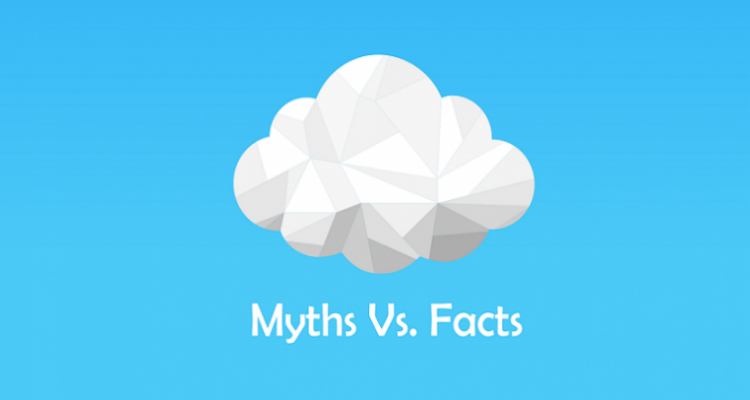Cloud model is the buzzing technology of today and it is successfully enduring. The technology is here to stay and it will also empower future enterprises. Hybrid Cloud is the combination of computing infrastructure offered by various data centers and cloud providers. Today, enterprises are moving their application and hosting resources to the cloud. However, they don't want to be bound ceased by one Cloud vendor, rather they want to allocate their infrastructure across multiple platforms and providers. Hybrid cloud helps businesses exceptionally but many a times enterprises find it difficult to understand what actually hybrid cloud is, how it functions and what are its real benefits. It ceases the adoption of hybrid cloud by many businesses as they fear risks. This research paper is prepared to bring up the cloud myths and misconceptions and get them busted with the real world facts. This will help the enterprises with better clarity on hybrid cloud.
Hybrid Cloud Myths vs. Facts
Myth 1: Hybrid Cloud is not secured Busted: Security is the utmost important deal, especially when it comes to hosting and website security. Smallest of security glitches can directly impact the revenue and repute of the enterprise. Lack of security is one of the biggest myths about cloud. The reality is that risks remain the same with cloud, as it is with any other traditional IT solutions. In fact with other hosting services, you are the sole responsible for security while in cloud environment, The solution provider is equally responsible for managing security. Experienced and reputed cloud service providers will maintain multi-zone firewall, network and server protection technologies with latest encryption and other high standard security measures.
Myth 2: It doesn't come with enough bandwidth: The fact is some services will make the network imitate as an Ethernet connection, eliminating the distance between machines. But the server doesn't identify this and it works as same as it work on a WAN. Moving the servers to on-premises with better proximity will not affect the performance of server applications.
Myth 3: It's cheaper to use public cloud: Public Cloud can be sometimes quite cost-efficient option, but definitely, it's not the cheapest one. Rather, a hybrid cloud offers better cost effectiveness. In hybrid cloud, the user can easily switch to public cloud to balance the workload while on other occasions they can completely ignore public cloud and make use of private cloud, especially in case of sensitive data workloads to ensure higher levels of security.
Myth 4: Public cloud can be used for everything: The public cloud model fits for any kind of enterprise with small to large scale of operations, relating to any field or industry. But it may not support every task of the business. So depending entirely on public cloud is not a wise business decision. There are many activities where private cloud caters the best. So best cloud solution can be obtained from the combination of cloud services and providers.
Myth 5: Less Control of data in the cloud: Not exactly. Some cloud providers may be a little difficult in providing on-premise controls and on-demand self service. But a well organized good cloud provider will offer you with a hybrid cloud environment which will allow you to access high speed connection and you will be able to retain control on your data which you can move to the cloud later.
It's totally wrong. The facts hold that cloud based businesses are much more reliable than any other hosting platforms. Actually, almost every cloud solutions provider offer high availability with 98-99% uptime SLA guarantee. It also adopts high standards of security measures with robustly protected infrastructure, storage and hosting environment.
This is the reason why many businesses are shifting to cloud. They get improved security, high scalability, greater flexibility and high availability.
Myth 6: Moving large data to cloud is unworkable: Definitely not. With apt architecture and properly structured data will make the business store more data than usual. Organized data management will enable efficient storage and you will be able to move heavy data, more than ever with cloud.
Myth 7: Shifting to Cloud can wait! This could had been true if it was said some years ago! But in today's scenario when hybrid cloud is coming up with new capabilities every now and then, and everyone is looking for better computing efficiency, this phrase holds no value.
Myth 8: The compliance to regulations is missing in Cloud: Managed private cloud by a reputed Cloud provider will also offer compliance factor. With right service levels, your business will have better compliance with industry policies, company policies, as well as national data regulations and laws. This will help in establishing quick and secured access at all specific locations.
Conclusion: Misconceptions are shallow information. The hybrid cloud myths are also propagated due to lack of detailed knowledge and incomplete information. Keeping up with technology updates, will keep you informed about the latest cloud developments. Today, it's more economical with high uptime SLA, sufficient bandwidth, and large network & cloud hubs.
So, bury all these Hybrid cloud myths and earn economic advantages by migrating your enterprise workloads to multiple cloud options, giving your business a boost with better efficiency and improved ROI. If you have any question or you are concerned about migrating your data to Cloud, let us know here

